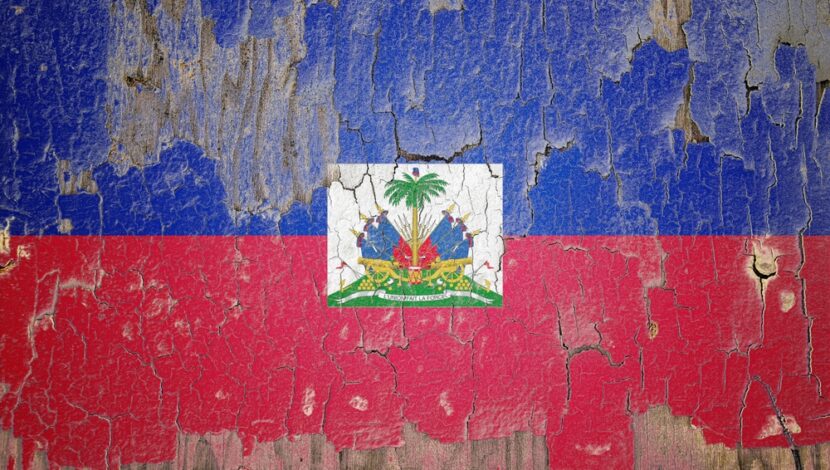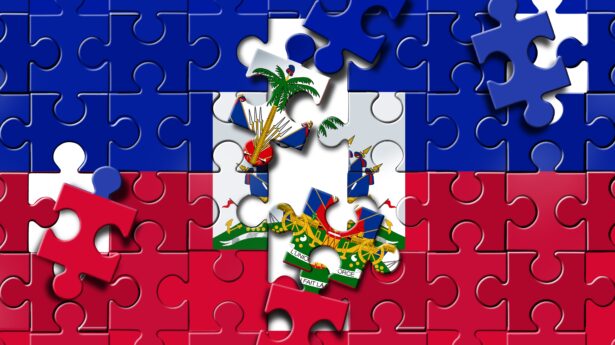The Unitarian Universalist Service Committee advances human rights through grassroots collaborations.
Haiti’s Struggle for Democracy Lives On

By Josh Leach on May 14, 2024
The epitaph of Haitian democracy has been written many times before. But so far, the pessimists have always been proven wrong. Haiti’s aspirations for democracy keep reemerging from the ashes. The same is true today. Even as Haiti faces enormous challenges—including widespread gang violence, poverty, and hunger—the Haitian people are making strides to secure the self-determined democratic future they deserve.
Reasons for Hope
Recent weeks brought new signs of hope for the struggle for democracy in Haiti. The country’s authoritarian Prime Minister, Ariel Henry—who repeatedly delayed elections while in office and concentrated power in his own hands—has finally stepped down. The transitional council, tasked with appointing Henry’s successor and facilitating the next elections, met for the first time and began its work—even as gunfire echoed outside the national palace where they convened.
Even apart from this ongoing violence, the transitional council has faced setbacks. Shortly after it first met, controversy emerged between its members. Concerningly, four members of the council announced the selection of a new prime minister, without buy-in from the others. Even worse, their choice raised concerns that powerful political actors in Haiti may be influencing the council’s work from behind the scenes.
For this reason, UUSC’s partners and allies at the Montana Accord—a coalition of Haitian civil society leaders that is represented on the council—condemned this move to announce a new leader without the other members’ consent, saying that it violated the spirit of transparency that was supposed to inform the council’s decisions.
This is not the end of the story, however. In part due to this outcry from Haitian advocates, the transitional council has since shifted course. As reported on May 9, the body has changed its membership and voting structure, to ensure that a larger proportion of voting members is needed to make binding decisions.
Clearly, the Montana Accord’s advocacy worked. This signals that Haitian civil society leaders, who are working for a democratic solution, can still shape the transitional council’s process. In other words, hope remains alive.
But Challenges Remain
To emphasize the signs of progress in Haiti’s political transition is not to minimize the grave challenges the country still faces. Paramilitary gangs continue to terrorize large parts of Haiti. Hundreds of thousands of people have been displaced from their homes. Extensive regions of Haiti are at risk of famine and starvation, due to the interruption of basic economic activity from the fighting.
Foreign intervention is often portrayed as the proper solution to these problems. Indeed, a multinational force from Kenya is expected to arrive in the coming weeks, and the U.S. government has already approved funding for its operation.
Yet, in more ways than one, foreign intervention is the reason Haiti is in this crisis to begin with. U.S.-made weapons have flooded the country, facilitating gang violence. Earlier decades of U.S. trade policy depleted Haiti’s agrarian economy, increasing its reliance on outside aid while gutting the Haitian government’s ability to protect its people.
One could extend the same story back even further, to U.S.-led coups and military occupation in the twentieth century, or to French colonization, which brought enslaved people to the island in the first place, and which later sought to bankrupt Haiti’s government after the country achieved independence.
Given this history of outside meddling, one can understand why Haitian advocates insist that any solution to the country’s political impasse must be a Haitian-led solution.
Throughout this history, outside observers have repeatedly underestimated the Haitian people. In the first decades of Haiti’s history, many white U.S. and European politicians hoped the new country would fail—since it provided a model to the world of the successful self-liberation of formerly enslaved people. In modern times, outside reporters and politicians have similarly discounted Haiti’s future, characterizing it as a failed state.
Throughout all these challenges, however, the Haitian people’s struggle for democracy and a self-determined future has endured. The same is true today. Now as then, outsiders are tempted to discount Haitian democracy. They have been proven wrong every time before. And the Haitian people will prove them wrong again, no matter how long it takes.
Learn More and Take Action:
UUSC members can support Haitian civil society leaders in their struggle for a Haitian-led solution. Sign up to our email list for regular updates. Donate to support our partners’ work with a contribution to our Annual Fund.
Finally, Haiti’s future depends on the safety and wellbeing of all Haitian people, including in the diaspora. You can take action with UUSC to stop U.S. deportations to Haiti and ensure that no people are removed against their will to a country facing crisis. Join us in telling the White House to stop the deportation flights to Haiti today.
Image credit: Shutterstock – zmotions

